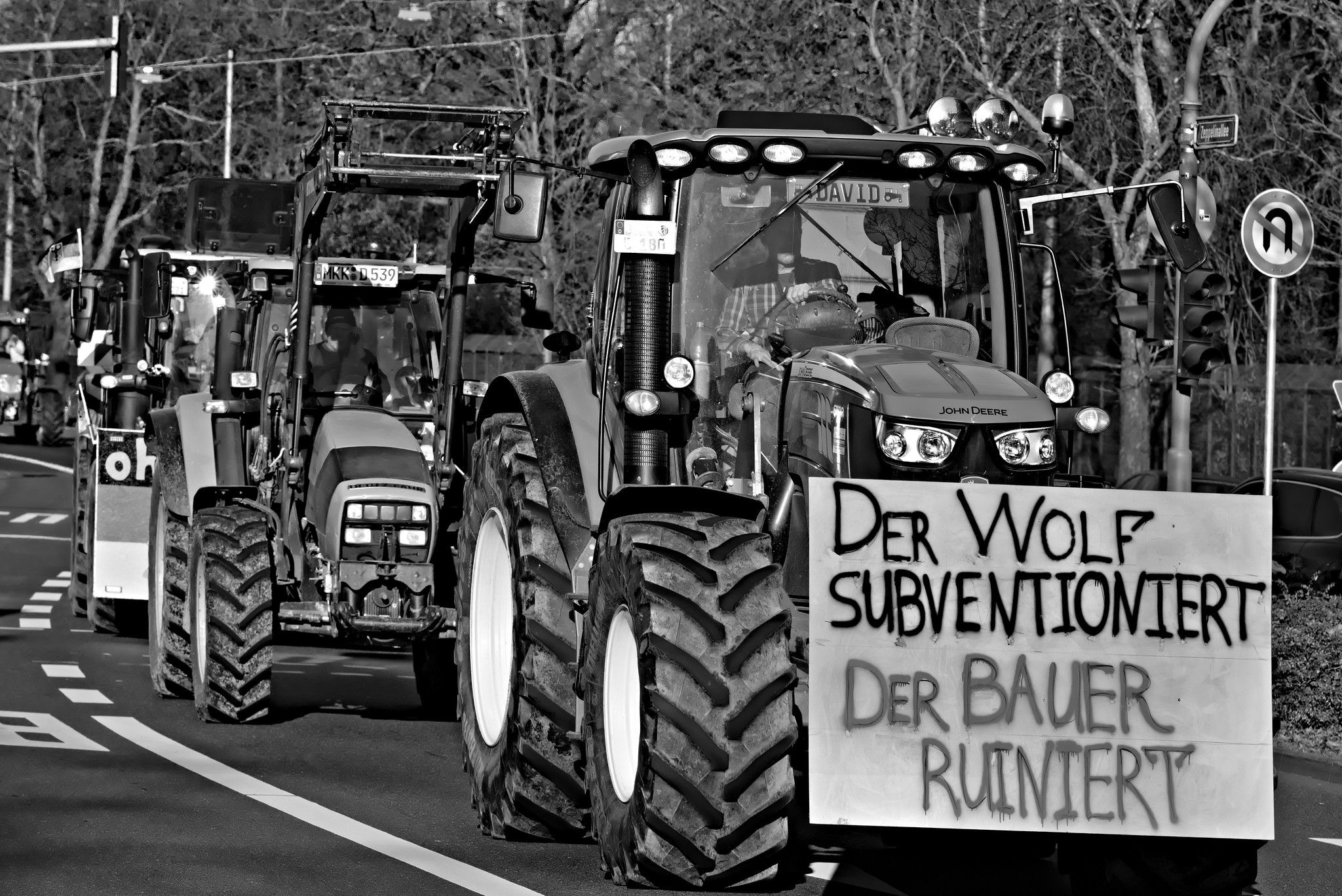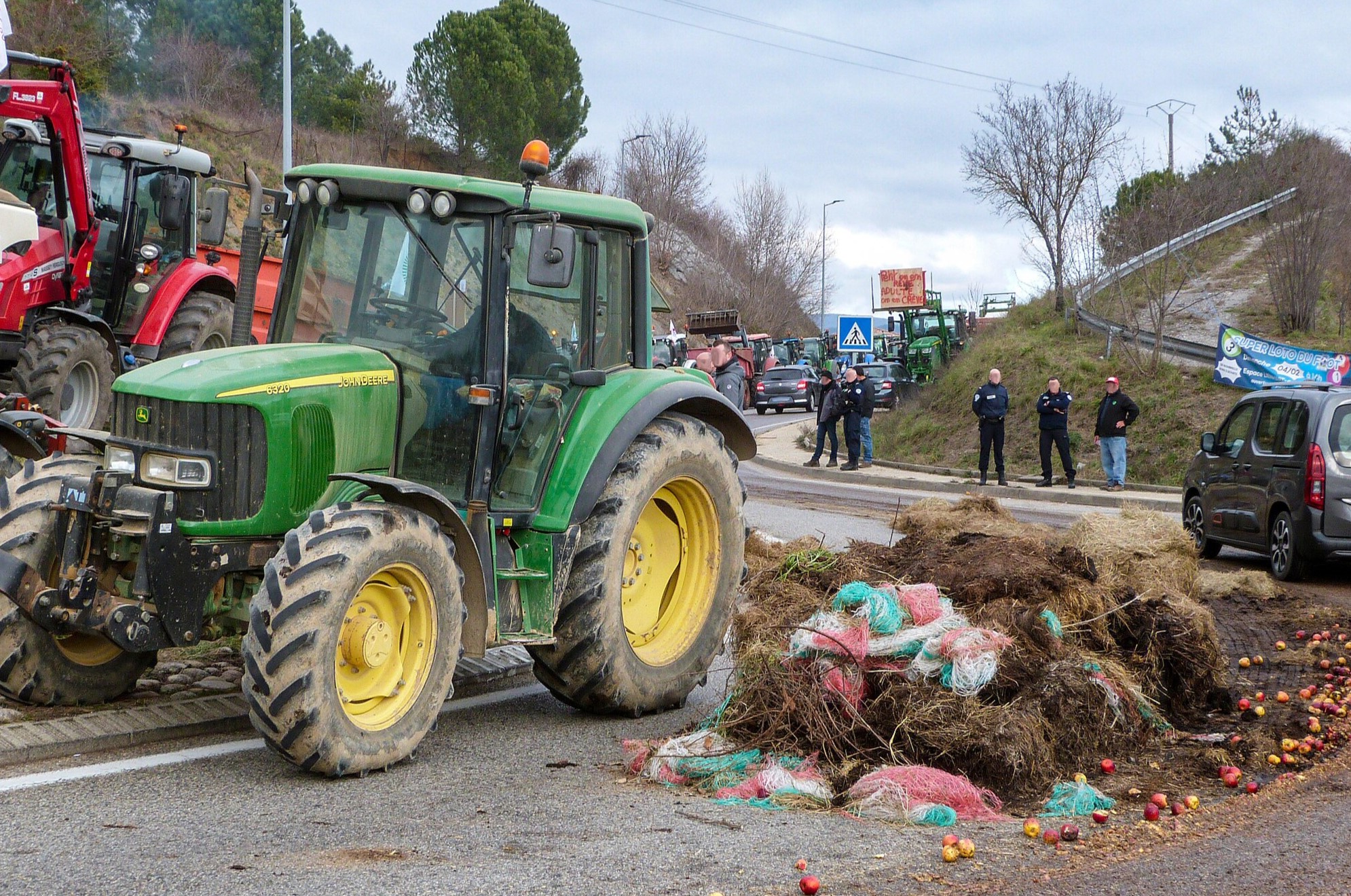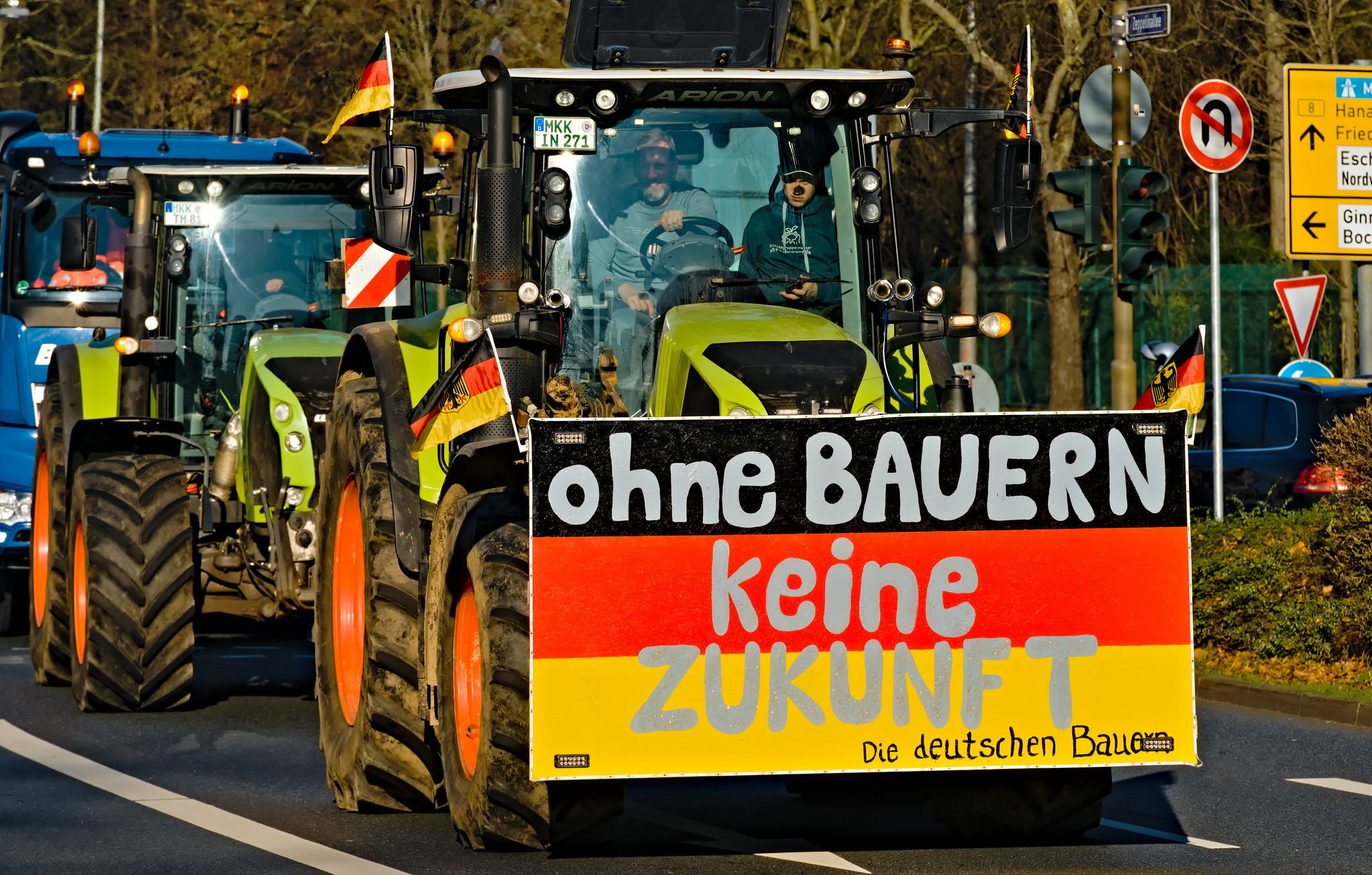Unrest is spreading across the European countryside, from Poland to Spain, Germany, Switzerland, Romania and Greece. Farmers are on the move, and they have not flinched from using the most militant methods – in stark contrast to the ‘respectable’ methods we are used to from the trade union leaderships. They are getting concessions and millions of workers are taking note.
The ruling class has been thrown into a state of alarm.
Under this pressure, Ursula von der Leyen has promised to scrap proposals to halve pesticide usage. The French, Spanish and Greek governments have all promised to boost subsidies to the sector. France has also scrapped a planned diesel tax increase under pressure from the farmers, while President Macron in France and Taoiseach Varadkar in Ireland have both come out against the trade deal with food-producing nations in Latin America’s Mercosur.
The clear lesson is that militancy pays.
The farmers are only a tiny fraction of the population – 2.5 percent in France, and little more than 1 percent in countries like the Netherlands and Germany – and yet, armed only with tractors and numbering just a few tens of thousands, they have succeeded in not only wringing concessions, but in splitting governments and the EU itself.
Leaving aside the content of their demands: what an example they are setting for workers!
In Belgium, Spain, Poland, France and Germany, we’ve seen roads to cities blockaded. Major sea ports like Zeebrugge have been blockaded. In Belgium, farmers shut down highways along the Dutch border, whilst Polish farmers on a 30-day strike have done the same along the Ukrainian border, blaming a flood of Ukrainian imports for a 40 percent drop in prices over 2023.
“He who sows misery reaps anger,” read a French farmer’s placard. “We’re here to start a fire,” a Belgian farmer put it, even more bluntly, outside the EU Parliament building. There, outside the seat of the European Union parliament, barricades were formed of tractors and burning tyres, statues were toppled, and the seat of the parliament building was bombarded with rocks and eggs. Elsewhere too, tractors have laid siege to government buildings.
The major supermarket and wholesale monopolies have also been targeted. In Belgium and France, burning hay bales have been used to barricade Aldi and Lidl distribution centres. Farmers from the southwest of France promised to ‘lay siege’ to Paris, shutting down the capital by parking dozens of tractors outside the Rungis food trade centre – a 570-acre wholesale facility known as ‘the belly of Paris’. Catalan farmers followed suit, blockading Europe’s biggest wholesale market by volume of fresh food, situated in Barcelona, as well as the port of Tarragona.
This is a million miles, in words and deeds, from the meek and mild trade union leaders – many of the farmers’ own leaders not excepted. The multi-millionaire leader of the French farmers’ union FNSEA, for instance, has pleaded helplessness before the actions of his members: “I’m trying to call for calm and reasonableness”.
What really disturbs the ruling class, what really robs them of sleep at night, is the fear of the example this sets.
“Once you accept [violent] action by some,” warned France’s former agricultural minister, “you shouldn’t be surprised if others start to follow suit.”
With 15,000 police deployed to contain the unrest in France, the French police union warned the government that it must “find the social fire extinguisher, to put out the fire to try and calm the situation”. Failure to do so could see “other trades getting involved”, which would “paralyse the system”.
This is precisely why the ruling class has moved to make concessions. They must damp this movement down, because they sense they are sitting atop a powder keg. This example has all the potential to spread.
Political turmoil to follow
 This movement is full of dangerous political implications for the ruling class / Image: conceptphoto.info, Flickr
This movement is full of dangerous political implications for the ruling class / Image: conceptphoto.info, Flickr
This movement is full of dangerous political implications for the ruling class.
Last year, the Dutch Farmers-Citizens Movement (BBB) swept aside all other parties to top the polls. It was not the party’s reactionary programme, but the methods of the farmers, with which the party was linked, that resonated: that they were prepared to take off their gloves, to launch a frontal assault on hated governments and institutions of the ruling class.
With European elections pending in June, the ruling class across Europe is afraid of similar instability at the polls spreading.
The far right, from the National Rally in France to AfD in Germany, are attempting to make hay out of the situation. Ironically, their programmes offer nothing to the farmers. AfD, for instance, has long opposed agricultural subsidies. While protectionist programmes of the right may appeal to farmers, ironically the far right’s promise to cut migration doesn’t square with their interests at all. Most farmers, including small farmers, completely depend on exploitation of cheap migrant labour.
But if one policy is a winning ticket for the far right in the coming elections, it is opposition to the Ukraine war, which has pushed up fuel costs and led to an influx of cheap Ukrainian grain into the EU market.
These protests starkly illustrate how western imperialism’s stupid policy of sponsoring an unwinnable proxy war against Russia has come back to bite them. They have failed to cripple Russia, but they have succeeded in creating serious problems for themselves at home. US imperialism, in particular, has been able to blithely push ahead with this war, which is remote from its shores, but for the European ruling classes it is creating a world of problems.
We confidently predict in advance, however, that if the far right do make advances, many on the so-called ‘left’ will draw all the wrong conclusions. They will bemoan the rise of ‘fascism’, completely missing the main point, that the left itself has abandoned the field.
Across the continent, much of the so-called ‘left’ has linked arms with its ‘own’ ruling class over Ukraine. In Germany, the left and the unions have joined hands with the hated banks and corporations, and liberal politicians against the AfD. They are responsible. They allowed far right demagogy about a ‘left-wing’ establishment to be given an air of credibility. They must be cleared away in favour of a class struggle, revolutionary workers’ leadership.
Communists must make the point. We can use the example of the farmers to show: militancy pays, and with a similarly bold turn from the workers’ organisations, under the proper leadership, the anger in society could be channelled away from the far right, and turned in a revolutionary direction, against the capitalist system itself.
Farmers crushed
In fact, the right-wing defenders of capitalism – both liberals and far right – can do nothing to relieve the pressures grinding down small farmers.
As capitalism lurches from one crisis to the next, the working class is being made to pay. But it is not just workers who are suffering. The crushing weight of the big banks, energy companies and supermarkets, trade disruption, inflation and soaring interest rates threaten to destroy the middle layers of small farmers and small businessmen.
This is precisely the layer on which the ruling class attempts to rest in ‘normal’ times. It is not a coincidence that the countryside – where life usually flows in quiet streams, and tradition runs deep – is where the bourgeois conservative and Christian Democratic parties all over Europe have been most deeply rooted.
 Western imperialism’s proxy war in Ukraine has driven up the cost of diesel and energy / Image: Kakoula10, Wikimedia Commons
Western imperialism’s proxy war in Ukraine has driven up the cost of diesel and energy / Image: Kakoula10, Wikimedia Commons
This ground is now shifting beneath their feet. That even the farmers are on the move, must send shivers down the spine of any thinking strategist of capital. The ferment in these middle layers is an early sign of big explosions to come. But the farmers, small capitalists themselves, cannot single-handedly challenge the rule of big capital.
In Europe, capitalism has certainly inflicted blow after blow against small and medium farms. Inflation is crushing them. Western imperialism’s proxy war in Ukraine has driven up the cost of diesel and energy. Meanwhile, high interest rates are sparking a wave of bankruptcies of mortgaged farmers.
Ironically, much of the European ruling class’ policy has been aimed at trying to contain working-class unrest by keeping inflation down… at the expense of small farmers.
This is the reason (and not ‘solidarity’, as they claim) that the doors of the EU were flung open to cheap Ukrainian grain. Meanwhile, Europe’s ruling class are trying to attract cheap food imports by pushing ahead with trade negotiations with the food-producing nations of Mercosur in Latin America.
The big supermarket chains and wholesalers are not the ones suffering: quite the opposite. Their monopoly position gives them some leeway to artificially keep prices high for consumers when inflationary pressures start to ease, whilst simultaneously using the glut of cheap imports to push down prices when purchasing from the tens and thousands of small and medium farmers.
Thus, while food price inflation remained over 7.5 percent for consumers across the EU in the last quarter of 2023, farm-gate prices actually fell 9 percent in the year up until late 2023, back to pre-Ukraine war levels. The energy, supermarket and wholesale monopolies are pocketing much of the difference.
Meanwhile, the general crisis – and, let us not forget, the rush to rearm! – is pushing up government debt. Who will pay? Workers, through austerity, but also small farmers through cuts to subsidies. Even before the crisis, 80 percent of subsidies under the EU’s Common Agricultural Policy (CAP) went to the richest 20 percent of farmers.
It is the poorest farmers, working 60 hours per week, who will end up going under. And now, these same farmers are being told by the EU that they must cut back on pesticide and fertilisers and keep fields fallow for environmental reasons. But the market forces small farmers to apply such environmentally damaging farming methods in order to resist being crushed by the giants of agribusiness. In fact, just 15 multinational meat and dairy corporations are responsible for methane emissions equivalent to 80 percent of the whole of the EU.
Naturally, when small farmers feel that they are unfairly being punished, they naturally become open to the influence of right-wing climate deniers. And yet, ironically, climate change looms large over the farmers, through drought and wildfires, which have had a particularly devastating impact in Greece and elsewhere in the last year.
Some on the left – having noted far right influence in these movements – claim that this is an inherently reactionary movement, that we can offer nothing to the farmers. Across much of Europe, the far right certainly is dominant, with many ‘unions’ bringing together small farmers and big agribusiness under one umbrella, and under the political domination of the corporate giants.
But these farmers’ protests are anything but even. Agribusiness clearly stood behind the nitrogen protests of farmers in the Netherlands last year and far-right influence was palpable. But in Catalonia, the situation on the land is such that the movement is dominated by small and very small farmers, whose union leans distinctly to the left.
For the small farmers, only the working class – by taking power and nationalising the big banks, energy companies, supermarkets, wholesalers and the giants of agribusiness – can offer them a secure, decent life. A planned economy producing for need, in harmony with the environment, can offer much better terms to small farmers than private banks and supermarkets that intend to squeeze them dry for profit.
Once the wholesalers and banks are nationalised under a plan of production – and it is these major levers of the economy that communists want to take control over, not small businesses and small farms – it will cost society little to offer good prices and cheap credit to small producers. We could render every assistance, which a planned economy alone can render, to implement sustainable and environmentally-friendly farming methods.
Only communism can offer a way out. The argument used to go that the middle, petty-bourgeois layers in society, like farmers, would never accept communism because it’s too ‘extreme’, too ‘radical’, too ‘militant’. It would scare them off. Well, now the farmers have shown that they are quite prepared to make use of the most militant, the most extreme, the most radical methods. Only these methods will do – not just for the farmers, but for millions of workers.
There’s a lesson in there if the labour movement leaders choose to learn it. And if not, they should step aside in favour of those who have learned this lesson.

